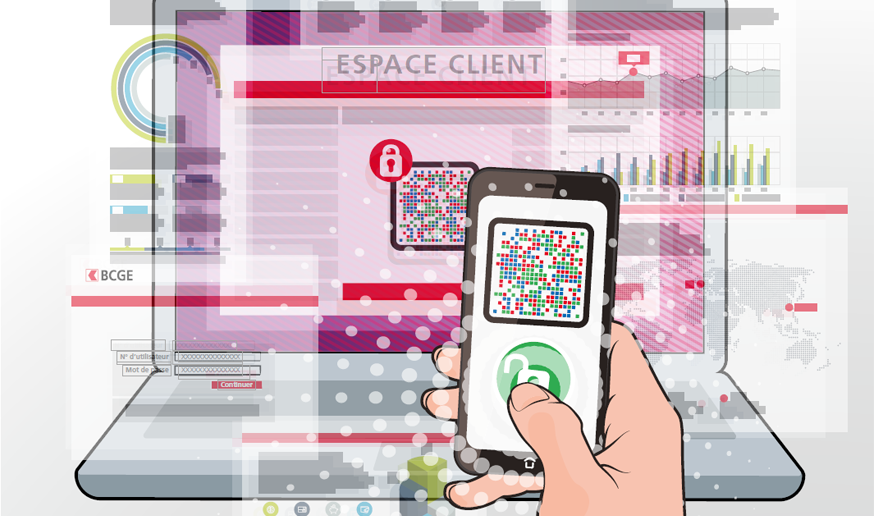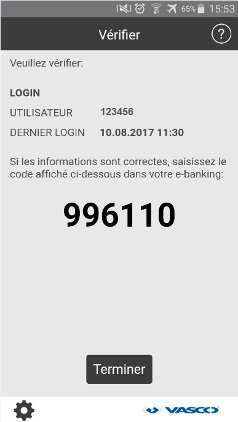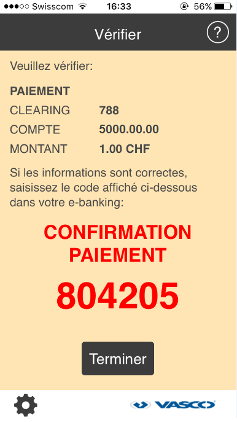
Connection to Online solutions
Please apply basic security rules while connecting to your online banking.
Use a secure computer
- Never carry out your BCGE Netbanking operations using a public computer, in an internet café, a hotel, etc. because the administrator of that computer could trace all your operations or try to interfere with your BCGE Netbanking connection to conduct operations on your accounts.
- Do not use a WIFI connection which is insecure or insufficiently secure for your banking operations.
- Do not browse in “administrator” mode or use BCGE Netbanking from a “guest” account.
You should not communicate this information to anyone. Even the members of BCGE staff only have access to your user number. You are the only one who knows your password
More and more e-commerce sites are asking you for your e-banking access codes to pay for the purchases made online: your account is then debited because the site connects using your e-banking access codes to terminate the payment process. These sites generally indicate that they have a partnership with a multitude of Swiss banks, which is utterly false. You are strongly advised not to give your codes on these sites, or to any third party. In the event of a problem, you would be responsible for any losses incurred on your accounts because you were the one who gave your access codes to a third party or, worse, to people with malicious intent.
Managing cookies
A BCGE cookie must be stored on your internet browser to enable the BCGE Netbanking connection: this cookie is used to enhance the security of the connection
Check the address
Ensure that the BCGE Netbanking address always starts with https://www.bcge.ch or https://netbanking.bcge.ch and that the padlock, certifying that the connection is secure and that the site is authenticated, appears.By clicking on the padlock, the certificate issued by Digicert Inc (certification company), will be displayed, informing you that https://www.bcge.ch or https://netbanking.bcge.ch is an internet site belonging to the Banque Cantonale de Genève.
There is no need to check the entire address which appears in the address bar of your browser.
What comes after https://www.bcge.ch or https://netbanking.bcge.ch is irrelevant.
Error messages
When you browse BCGE Netbanking, read all the error messages carefully.Pay attention to messages which do not come from BCGE Netbanking and which could come from other sites or programmes: this type of message could be a sign that your computer is infected. If in doubt, print out the screen showing the message, log off your BCGE Netbanking session and contact our hotline.
Display information for Cronto Sign
When you carry out a transaction on BCGE Netbanking, using Cronto Sign, take the time to check that the screen displayed on your authentication device corresponds to the stage of the transaction you are at on your computer and check that the data displayed is correct before keying in your code and validating your operation.If these elements do not correspond, this could mean that your computer is infected by malware or that your session has been hijacked by a fraudster.
If in doubt, take a screenshot of your screen, exit your BCGE Netbanking session and contact our Hotline (058 211 21 00).
Remain very alert when carrying out transactions online and systematically check the data for each transaction before validating
- Remain very attentive when carrying out your transactions online.
- Check the data displayed on the screen in detail (transaction amount, etc.).
- Check that the stage of the transaction corresponds to what is displayed on the screen.
- Do not key in your code or validate your operation before systematically and thoroughly checking the data at every stage of the transaction.
When connecting to BCGE Netbanking using Cronto Sign
-
Check the message that appears on your Cronto device. It should indicate the date of your last connection and a confirmation code.

When signing for a payment on BCGE Netbanking using Cronto Sign
-
Check the message shown on your device.
- Check that the data displayed is consistent with your payment data before validating

If some elements do not correspond
-
Do not apply the code displayed on your device (Cronto Sign)
- Contact the BCGE Netbanking Hotline on 058 211 21 00 (7.30am to 7.30pm Monday to Friday, 9am to 4pm Saturday).
Logging off the session
When you have finished your BCGE Netbanking session, click on the “log out” button to disconnect safely.
If you fail to do this, your session stays open for 10 minutes and a third party could connect to your accounts. Anyone who might use your computer could return to your BCGE Netbanking session simply by clicking on the “back” button of your browser.
Clicking on “log out” ensures that the full login process to BCGE Netbanking (user no., password and random code) must be completed, thus preventing any illegal access.
Cleaning your computer
When you browse online, your browser saves all the web pages you have consulted in a folder on your computer (known as “cache memory” or “temporary internet files”).
Similarly, files that you download (your e-documents for example) are also saved in this folder or another that you might have specified (your office, for example).
To guarantee the confidentiality of your data and to prevent a third party who might use your computer or who might gain unlawful access to the same from reading or recovering these files, it is advisable to delete the said files in your office folder or another folder you might have specified (always check where your files are saved so that you can delete them properly). In computer jargon, this is referred to as “emptying the cache”.
Do no communicate your access codes to anybody
Your means of authentication (user number, password and BCGE Netbanking card) are your entry keys for accessing your data with the BCGE, via BCGE Netbanking.It is essential that your means of authentication are protected to guarantee the security of your data. The following recommendations should be observed:
- Refrain from writing your password or your user number on your BCGE Netbanking card: in the event of loss or theft, a third party would the have access to your codes.
- Keep your BCGE Netbanking cards in a safe place
- Do not cross out the codes of your card once they have already been used
- Choose passwords that are difficult to guess: incorporate figures and letters, capitals and lower case
- Avoid passwords that a third party could link with you (date of birth, phone number, children’s names, etc.)
- Never use a password that you already use on another website
- Change your password regularly (every 3 months)
You should not communicate this information to anyone. Even the members of BCGE staff only have access to your user number. You are the only one who knows your password and your card codes. BCGE staff will never ask you for these codes, either by phone or by e-mail.
More and more e-commerce sites are asking you for your e-banking access codes to pay for the purchases made online: your account is then debited because the site connects using your e-banking access codes to terminate the payment process. These sites generally indicate that they have a partnership with a multitude of Swiss banks, which is utterly false. You are strongly advised not to give your codes on these sites, or to any third party. In the event of a problem, you would be responsible for any losses incurred on your accounts because you were the one who gave your access codes to a third party or, worse, to people with malicious intent.
Memorise your password and do not write it down anywhere.
-
Remember your password by heart
- If you use a very secure password which is difficult to remember and you write it down somewhere, make sure you keep it in a safe place
- Above all, do not write your password on your BCGE Netbanking card: in the event of loss or theft, a third party would then have access to your codes.
Avoid a password such as birthday, first name, etc.
-
Choose passwords that are difficult to guess: incorporate figures and letters.
- Avoid passwords that a third party could link with you (date of birth, phone number, children’s names, etc.).
- Never use a password that you already use on another website.
